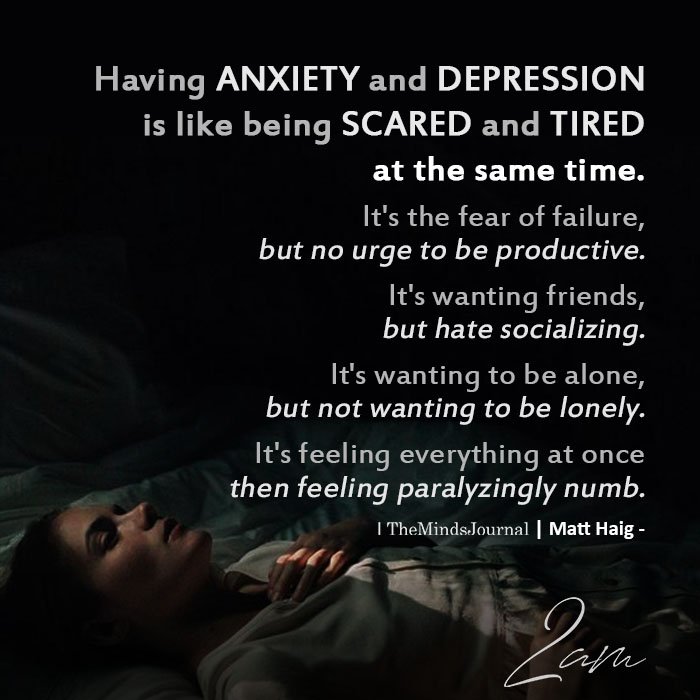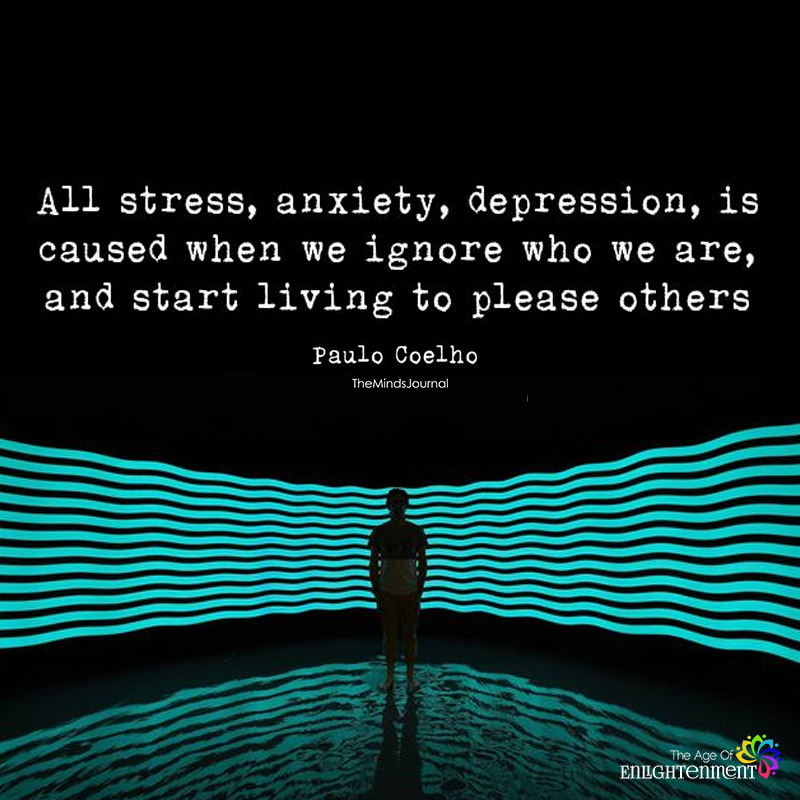Anxiety is not something we are born with. We acquire it due to several external conditions. Sometimes we fall prey to it, while other times, we subconsciously invite it. But seldom do we realize, that anxiety can also manifest itself in the most unusual ways. Enters the case of High Functioning Anxiety Disorder. What makes this interesting, is that not only patients are unaware of their suffering, but are also able to unknowingly, yet effectively, deceive people in creating an impression of normalcy.
High Functioning Anxiety Disorder can be defined as “the tendency and practice of undertaking pursuits to avoid exhibiting chronic anxiety traits to the external world.”
To unveil this psychological enigma, we need to dive straight into the tell-tale signs of this mysterious condition that has been overlooked by the mental health communities, until now.
Here are some tell-tale signs you have high functioning anxiety disorder, the ways it affects your health, and how to effectively deal with it.
Related: How Yoga Can Help With Generalized Anxiety Disorder, Research Reveals
What Is High Functioning Anxiety Disorder?
High functioning anxiety disorder refers to a kind of anxiety where a person suffers from anxiety but manages to mask it and go about their daily life quite well. People suffering from this tend to be very put-together from the outside, yet suffer from intrusive and obsessive thoughts, worry, and stress on the inside.
Even though it is not a recognized mental health disorder, this type of anxiety plagues a lot of people, it’s just that we hardly get to know about their struggles. They are usually good performers in their workplace, maintain healthy social relationships, have stable romantic relationships, handle all their finances well, and carry out all their daily chores properly.
However, at the same time, they suffer from unwelcome and disturbing thoughts and feel anxious and worried about the future. It’s just that, they have become pros at hiding their anxiety well and getting things done.
5 Signs Of A High Functioning Anxiety Disorder
1. They’re Successful, Yet Restless

People suffering from high functioning anxiety disorder will come across as successful professionals with relatively stable careers. They always arrive early, meet deadlines, exceed expectations, etc. On the outside, this looks absolutely normal since we all crave professional stability and want to climb the corporate ladder.
But as they say, looks can be deceiving. If you probe deep into their subconscious, you’ll find that they’re doing all this not out of the desire to excel in their career, but out of the fear and anxiety of losing out on their job.
We all subconsciously brood over our financial future and try to avoid mistakes as much as possible, but they are constantly worried about their performances even if they’ve received good, if not the best feedback in their appraisals. No amount of appreciation can relax them into acknowledging and contending with their own efficiency.
2. They’re Not In Tune With Their Personal Life

We all love enjoying our personal space after long office hours. But the same cannot be said about people suffering from high functioning anxiety disorder. Since they suppress their anxiety all day, their mind becomes exhausted from the emotional tension and tends to vent out the toxin.
This results in sudden fits of rage, mood swings, getting annoyed for no reason, depression, and a lack of interpersonal communication. Their family, their close ones, friends, and relatives remain bewildered as to why this person, who’s so successful in their profession tends to go haywire when engaging in their personal sphere.
Little do they know that these behaviors are but defense mechanisms to cope with the immense mental and emotional restraints they impose on their health to make things look normal at their workplace.
3. They Always Strive For Perfection, But Feel Incomplete Within

High functioning anxiety patients are addicted to delivering things with perfection. While such an attitude is highly appreciated in this era of competitive precision, things fail to work out well when this approach is taken a bit too far.
In this case, the person strives for perfection but feels imperfect all the time. No matter what they do, or how much effort they put in, they always have this nudging sensation of incompleteness. It is as if something is always missing. Now, the world around us manifests in the ways we perceive them to be.
So, for these people, their world is always in need of betterment. Be it in the office or personal space, they always hunt for improvement, even if things are going smoothly and in order. The more they feel discontented with things as they are, the more this feeling tends to haunt them.
Related: Signs And Symptoms Of Generalised Anxiety Disorder
4. They’re Unable To Rest Even When Drained And Exhausted

People suffering from high functioning anxiety disorder perceive the world as a continuous flow of deadlines to be met at any cost. When tired after office hours, we usually take some rest by mentally distancing ourselves from all the professional hassles, but that is not the case with these people.
Their mind keeps poking them about the burdens of the next day. This keeps them from getting the minimum mental rest they need to get in order to function as a healthy individual. They always keep thinking about the next day and brood about their upcoming performances. Reason? Same, fear of failure
This level of anxiety somehow makes them feel that they have not performed as per the expectations (which they set up in their own mind by the way) and whether they’d be able to get things done the following day. And since every next day leads to yet another day of toil, the cycle is never-ending.
5. They Take Things Too Seriously, That To Others Are Not A Big Deal

People suffering from high functioning anxiety are deterred by small things. What to others seem very petty, lame, or insignificant, can bear enough gravity to suck out all their calm. They always feel that things are not in place and that something needs to be done to fix them.
This keeps them from enjoying the fruits of life. Instead, they always suffer from an internal conflict between satisfaction and restlessness. They want to feel accomplished in every step, no matter how insignificant they seem.
This self-imposed expectation robs them of their mental peace and substitutes it with discontent and misery.
Related: How I Healed My Life-Long Anxiety
3 Major Effects Of High Functioning Anxiety Disorder

High functioning anxiety disorder results in severe health repercussions. Since human emotions and physique are parts of the same continuum of existence, this psychological condition takes no time in taking over physical health. Let’s find out what are the effects of anxiety disorder.
1. Cardiac Issues
High functioning anxiety affects the blood pressure of an individual, thus increasing the chances of heart attacks and even failures in extreme cases.
2. Gastrointestinal Issues
Our stomach, liver and other components engaged in digestive processes need adequate rest and blood supply for proper functioning.
But since people suffering from high functioning anxiety disorder are deprived of the optimum level of rest, these abdominal components tend to malfunction, often leading to acidity, gastritis, nausea, vomiting, ulcer, etc
3. Sleep Deprivation
Lack of mental rest leads to chronic sleep deprivation in patients. This results in unwanted drainage of the vital energy necessary to sustain a healthy regular life. Less sleep leads to an improper REM cycle, thus disrupting the energy restoration phase.
How To Deal With High Functioning Anxiety Disorder

1. Face Your Fear
Anxiety is fueled by the fear of failing at certain pursuits. What you can do is challenge the fear by believing in your efficiency.
The moment you start acknowledging your performance in everyday life, the more you’ll find this anxiety that has grappled with you for so long, slowly fading away. Tell yourself that you have given your best and that you do not feel the slightest regret or guilt.
2. Get Rid Of The Self Imposed Deadlines.
This is one of the best tips for dealing with anxiety disorder. You’re not here to fulfill expectations, let alone construct them for yourself. High functioning anxiety stems from these self-imposed expectations that literally no one has asked you to fulfill.
By doing this, you’re only manufacturing obligations that lead to poor health and miserable life in general. You keep struggling and striving for results, but never reach the end. It is a perpetual loop of mental and emotional discontent that can be stopped only if you choose to not fuel them any further.
Related: How to Reclaim Your Power Absorbed by Anxiety: 5 Ways
3. Stop Seeking Perfection
There’s nothing wrong with being imperfect. Perfection leaves no room for improvement, thus hindering growth. If you truly want to prosper, make imperfection your friend, instead of trying to run away from it. Embrace the flaws, and your effect, and see how things turn up.
Always remember what the ancients said: “Living things are imperfect, that’s why they grow; only inanimates are perfect, that’s why they’re dead.”













Leave a Reply